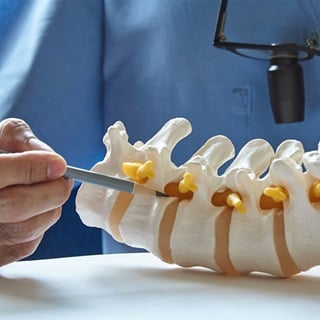Thoracic Disc Herniation

Overview
The thoracic spine consists of the 12 vertebrae between your neck and lower back. The ends of your ribs, although not attached to the spine, rest in indentations in the thoracic vertebrae that help support the ribs. This arrangement also makes the thoracic vertebrae more stable than other vertebrae. Disc herniation in the thoracic spine is relatively rare compared to the lumbar vertebrae in the lower back and the cervical vertebrae in the neck. Thoracic disc herniations account for less than 1 percent of all protruded discs.
Our Approach to Thoracic Disc Herniation
UCSF is home to one of the largest centers in the country dedicated to evaluating and treating spinal disorders, such as thoracic disc herniation. Patients have access to the most up-to-date diagnostic imaging techniques as well as innovative treatments that are not widely available. Our team includes world-renowned specialists in neurosurgery, orthopedic surgery, neurology, pain management, physical therapy, psychiatry, radiology and rheumatology. These experts work together to personalize a plan for each patient.
Thoracic disc herniation is treated with bed rest and pain medications. If the condition doesn't improve, or if the protruding disc is impinging on the spinal cord, we may recommend surgery. Our team's expertise in state-of-the-art surgical repair and rehabilitation results in less time under anesthesia, faster recovery and, ultimately, a better quality of life.
Awards & recognition
-

Among the top hospitals in the nation
-

One of the nation's best for orthopedic care
-

Best in the West and No. 3 in the nation for neurology & neurosurgery
Signs & symptoms
Symptoms of thoracic disc herniation may include:
- Pain in the upper back
- Numbness, pain or tingling from the upper back and around the chest
- Leg weakness
- Chest pain
Diagnosis
Your doctor will examine your movements, strength and reflexes. He or she also may recommend the following tests:
- Magnetic Resonance Imaging (MRI). An MRI provides detailed pictures of the spine that are produced with a powerful magnet linked to a computer.
- Computed Tomography (CT) Scan. A CT scan uses a thin X-ray beam that rotates around the spine area. A computer processes data to construct a three-dimensional, cross-sectional image.
- Myelogram. This is an X-ray of your spine taken after a special dye has been injected into the spinal column. It can show pressure on the spinal cord or problems with discs or vertebrae.
Treatments
Most often, thoracic disc herniation is treated with bed rest and pain medication. However, surgery may be recommended if the condition doesn't respond to conservative treatment or if the disc is impinging on the spinal cord and causing symptoms or signs of spinal cord dysfunction.
Surgical treatment consists of removing the damaged disc or discs, a procedure called a discectomy. It also may include removing the lamina, the upper part of the vertebrae, to give the spinal cord more room. In the past, discectomy was usually a major surgery done through a large incision. Today, it is more likely to be performed using small incisions, miniature instruments and a viewing instrument called an endoscope.
UCSF Health medical specialists have reviewed this information. It is for educational purposes only and is not intended to replace the advice of your doctor or other health care provider. We encourage you to discuss any questions or concerns you may have with your provider.










